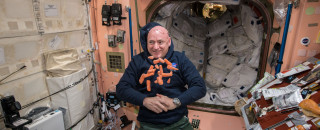Lecture Series History: 2016
In 2016, the Natural History Museum of Utah's annual Lecture Series presented a series theme of "Unraveling the Unknown." Read on to learn more about the theme and speakers.
About the 2016 Lecture Series
The Natural History Museum of Utah is pleased to present its tenth annual NHMU Lecture Series, Unraveling the Unknown. Darwin's voyage on the HMS Beagle, Magellan's circumnavigation of the Earth, the Apollo 11 mission to the Moon-the discoveries of these and countless other bold explorers transformed the way we think and led to monumental achievements. But the age of discovery is not behind us. In 2016 there remain vast scientific questions yet to be answered.
In this year's lecture series you will meet 21st century adventurers whose research and discoveries are destined to expand our understanding of the world as they push the boundaries of science. We invite you to explore the outer limits of space, the immense depths of the oceans, and mysteries yet to be examined in jungles across the globe.
I'm very grateful for the incredible and ongoing support of our Lecture Series Founding
Underwriter the R. Harold Burton Foundation, our Underwriter the Cultural Vision Fund, and the many generous sponsors and partners who make this series possible for our community.
2016 Speakers
Captain Mark Kelly
An Evening with Astronauts Mark & Scott Kelly
Captain Mark Kelly has spent more than 50 days in space, commanded Space Shuttle Discovery, and visited the International Space Station on four different occasions. Today, Mark is partnering with his twin brother and fellow astronaut, Scott Kelly, in an unprecedented NASA study on how space affects the human body. Scott, currently serving a year-long mission on the International Space Station, and Mark are participating in a detailed study of long-duration space flight. NASA's Twin Study will examine many effects of space travel to identify physical challenges that must be overcome before astronauts venture to Mars and beyond. Hear from both brothers as they discuss their experience in space, the Twin Study, the U.S. space program, and a future mission to Mars.
Phyllis Coley
Biodiversity in the Rainforest: The Hidden World of Nature's Toxins
Every year, Dr. Phyllis Coley spends months exploring the world's rainforests, searching for tropical plants and insects that have been co-evolving for millions of years. Tropical plants have deployed a stunning array of chemical defenses to protect themselves from predators. But their predators have evolved equally astonishing counter-defenses, in effect, creating an arms race between plants and insects. Coley proposes that these interactions not only help explain the high local diversity of rainforests, but why there are so many species of plants and insects to begin with. She has used her discoveries to promote a drug discovery program to find medicines in rainforests and promote conservation.
Zoltán Takács
From Nature to Medicine
The power of venom to heal has been recognized for millennia, but of the more than 20 million toxins produced by venomous animals, only a few thousand have been studied in depth. As habitat is destroyed and species extinction accelerates, the race to uncover unique toxins-and potential cures-is as critical as ever. Crossing 147 countries for work, pleasure, or by accident, one of the world's top risk-takers, Dr. Zoltán Takács, is a scientist, adventurer, and National Geographic Emerging Explorer who has taken on the unenviable task of finding and capturing the world's deadliest creatures for drug discovery. Diving on coral reefs and trekking through inhospitable deserts and rainforests, Takács' life-saving work requires as much physical skill as it does academic rigor.
David Gallo
Deep Sea-Deep Secrets: Exploring and Understanding the World Beneath the Waves
The oceans cover more than 70% of the Earth, provide half of the oxygen we breathe, and supply protein to more than one billion people. Despite their significance, we have explored only 8% of the oceans. In that 8%, we have found the world's greatest mountain range, thousands of deep valleys, and animal communities that rival tropical rainforests in diversity and density. We are just beginning to understand the oceans' role in human origins, evolution, and destiny. For over 25 years, Dr. Gallo has been at the forefront of ocean exploration. He has participated in expeditions to all of the world's oceans and was one of the first scientists to use a combination of robots and submarines to explore the deep seafloor.
